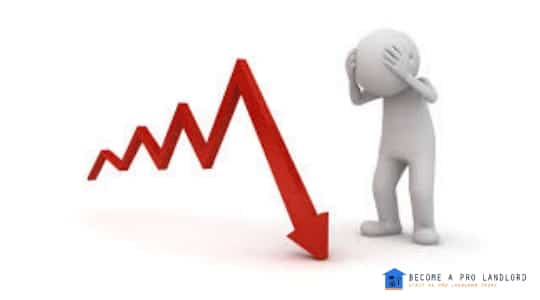Dollar Collapsing? Should You Own Real Estate? Survive Weaking Dollar
There have been many headlines and heated debates from the last week that the dollar is on its way to collapse. The US dollar has lost its value by 8%-10% compared to the previous year. The national debt has also reached its ceiling height. Is the dollar on its way to collapse?
Will your real estate portfolio survive this economic turmoil? What should you own when the dollar collapses?
Is the Dollar Collapsing?
An intelligent investor always stays ahead of economic trends and is well-informed to take timely financial decisions. What are the current economic indicators suggesting? Is the dollar really on the brink of collapse or any time soon? History is full of lessons. Currencies have collapsed in the past be it the Venezuelan Bolivar, Argentine Pesos, Hungarian Forint, or the Euro.
So what about Dollars? Can the dollar collapse? Yes, certainly, fiat currencies including the dollar can collapse. But is it collapsing anytime soon?
What Factors Contribute To The Collapse of the Dollar?
1. National Debt
When the nation`s debt is too high, the country’s economic growth stalls. More money will go towards paying off interest payments on debt. There will be less money available for key investments like public infrastructure, education, and other priority areas. The declining growth and overall negative sentiments will sway away investors’ interests in other countries. Unemployment rate increases. A drop in household and business confidence in the currency.
The current US national debt is about $31.4 trillion, at its current ceiling height. The deficit spending is hurting the US economy badly. In 2022, about $476 billion dollars alone were spent on paying interest payments toward the national debt. The US national debt accounts for 127% of the country`s total GDP today and counting.
2. Hyper Inflation
When the reserve prints more money to pay debts, and the liquidity is not backed by consumer spending and overall economic growth, hyperinflation can kick in. Hyperinflation shrinks the purchasing power of the currency and if it’s not controlled, currencies can collapse. Hyperinflation though is a rare event to happen in developed economies, but it has happened multiple times in the past in different economies.
In the US, the Federal Reserve keeps inflation in check by artificially controlling interest rates. The Fed from March 2022 till May 2023 has increased the interest rates 10 times to keep inflation at a healthy level. In 2022, the annual inflation rate reached 6% which is the highest from 2011 from 3.5%. The Fed tries to keep the US healthy yearly inflation rate at 2%. With the current scenarios, hyperinflation in the US is highly unlikely.
3. Political Instability
Political instabilities in the country can lead to a collapse of currencies. In events of war, or military coup, the economies take a hit. Constricted supplies break the cycle of supply and demand. Inflation rises in the country and currencies can tumble. The Russia- Ukraine war is a prime example. The Russian Ruble lost 50% of its value against the dollar in that period.
So, do we see the US dollar collapsing anytime soon?
The dollar is far far away from collapsing anytime soon. In the global financial system, the US dollar has a special reserve currency status. The US dollar contributes to about 60% of global foreign exchange followed by 20% Euro and then other currencies. Almost all major countries keep the US dollars in their reserves.
If the countries and their investors sway away from dollars, a massive wave of exchange rate volatility and disruption of the complete trade and supply is inevitable. It’s highly unlikely for the dollar to collapse. The only concern is the ever-increasing national debt and its implications on collapsing the dollar.
However, as an investor, you should keep a watch on the de-dollarization trend that is taking rounds as many economies have slowly drifted away from dollars and started piling gold in their reserves. If reports are to be believed, the dollar contributed 71% of forex reserves in 2001 and declined to 58% in 2022.
How Does A Weakening Dollar Impact Real Estate Markets?

The US Government depreciates the US Dollar to try to balance the trade deficits. The weaker the dollar is against the other country`s currency, the more services and goods they will import from the US. Exports will flourish due to a weak dollar.
However, a weakening dollar can act as a double-edged sword as the cost to import goods will now be expensive due to a weak dollar. Americans import more goods than they export which will hurt the economy.
Due to the impact of the weakening dollar, real estate will become more appealing to foreign investors who will now be able to buy at a discounted price because of the depreciated dollar value. But what implications a weakening dollar will have on your real estate holdings?
The Implications Of A Weaking Dollar On Real Estate
1. When the government depreciates the dollar, inflation kicks in, and the cost of buying goods and services increases. During inflation, rents also increase causing the value of your real estate to increase.
2. The cost of construction increases due to the inflated price of building materials which results in stalled construction. Your asset becomes more valuable and you will see an increased demand for your rental units.
3. The Fed hikes the interest rates to tackle inflation, increasing borrowing costs. Higher borrowing costs translate to higher monthly mortgage payments. When more money goes towards paying the mortgage payment; rents increase to offset the higher payments and for rental owners to stay profitable.
4. The higher borrowing costs also slow the demand for home ownership. A reduced demand causes property prices to fall which improves the cap rates. Low prices and high rents reduce the risk of buying a real estate asset making it more attractive.
Overall, a real estate investor sees a positive implication when the dollar weakens.
Is Your Real Estate Portfolio Safe When the Dollar Weakens?
You should understand the fact that you are not betting on the complete US real estate market. As an investor, you should be concerned for your property, and not the whole real estate market. When the dollar weakens, despite the US real estate doing well or not will not paint a complete picture of how your real estate portfolio will do. Rather, your portfolio will be affected by how the local economy is doing after the weakened dollar.
Local economic conditions will decide how your real estate portfolio will perform when the dollar weakens. The businesses that are importing more than they are exporting will tend to suffer. Not to forget, the elevated borrowing costs will cause an additional burden on the profitability of such businesses. If a major employer runs out of business in your city, your real estate portfolio will suffer.
You should closely watch how the local economy in your area is performing. In the real estate sector, areas that have strong economic activities going, have major employers will tend to perform well even during uncertain times.
Is There Any Specific Type Of Real Estate Investment That Is More Resilient During Economic Crises?
While real estate in itself is a safe haven compared to other investments during uncertainty, the Multi-Family real estate tends to be more resilient compared to any other real estate. Plexes, Apartment complexes are where your investment holding should be. You should have exposure to multi-family real estate in your portfolio for more resilience and diversification.
When the dollar is declining and the economy is not performing well, the demand for affordable housing shoots up. Not everybody can afford to pay high rents in single-family big homes. The monthly household budgets tumble when inflation rises. And paying rent is the biggest monthly expense for any American household.
When the economic crisis widens due to the falling dollar, I want my holdings only in these three assets; Gold, Silver, and Real Estate.
Multi Family Homes are better than single-family homes in terms of affordability. And as an investor, there are a variety of reasons, your multi-family investment will be more resilient during weak economic times.
- During a bad economy, a lot of people were forced to move out of their rental homes when they could not afford the rent payments. And in that case, you can manage the risk by having multiple tenants at your multi-family property paying for your monthly mortgage. Remember what happened during the times of Covid.
2. When inflation rises, you need to raise rents for your tenant to counter the increased mortgage payments. And when you have multiple tenants, you can raise rents on multiple tenants and stay profitable even during a bad economic state.
3. Furthermore, in general, multi-family properties provide more stable returns compared to any other rental real estate.
Read: How Multi-Family Property Offers More Protection Over Single Family To Its Investors?
Eager to Buy The First Multi-Family Property In Your Portfolio? Get an exact blueprint to deploy your Multi-Family Investment with exact strategies, risks, and the most favorable places for a Multi-Family Investment in current economic times.
Wish to read more such interesting and informational content around real estate investing, do sign up for my newsletter and don`t miss a single update on our website.



